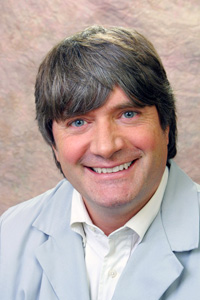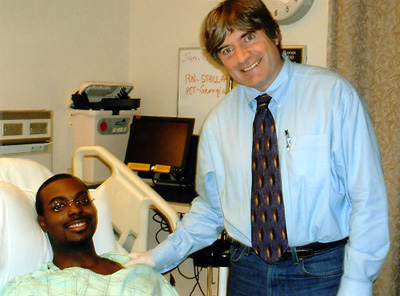Richard Burt, M.D., chief of immunotherapy for autoimmune diseases at Northwestern University’s Feinberg School of Medicine, and his research team appear to have reversed the neurological dysfunction of early-stage multiple sclerosis patients by using the patients’ own adult stem cells, thereby “resetting” their immune systems.
In May one of the study participants, Edwin McClure, walked across the stage to receive his degree after completing a rigorous graduate program at Virginia Commonwealth University. The young man appeared strong, healthy, and confident.
The scene was in stark contrast to four years earlier when the high school star football player was battling a severe cold, fatigue, and inexplicable visual changes.
“It was like someone turned down a dimmer switch,” he recalls. “My mom thought the problems were due to sinus pressure and would eventually go away, but when I got over the cold and still had difficulty seeing, she took me to an optometrist.”
When nothing surfaced during visits to an optometrist and an ophthalmologist, McClure was referred to a neurologist for follow-up.
After a series of tests and an MRI scan, the doctor delivered the diagnosis — multiple sclerosis (MS). The visual changes the young man was experiencing were due to optic neuritis, an inflammation of the optic nerve that occurs in approximately 50 percent of patients with the disease.
McClure was placed on steroids and interferon injections — a regimen that successfully controlled symptoms for two years. But when the MS started to break through, his physician switched to another medication.
“Over the course of four months, I started to develop an allergic reaction to the drug,” McClure says. “Meanwhile, my disease was still progressing.”
McClure was at a crossroads: begin medications with significantly greater risk of side effects or, as his neurologist suggested, investigate a promising clinical trial underway at Northwestern University in Chicago.
He chose the latter, qualified, and enrolled in Dr. Burt’s study. McClure was one of the 21 patients in the trial, ages 20 to 53, who had relapsing-remitting MS for an average of five years and had not responded to at least six months of treatment with interferon beta. After an average follow-up of three years posttreatment, 17 patients (81 percent) improved and none got worse, according to Dr. Burt, whose findings were published in the March issue of The Lancet Neurology.
Resetting the Immune System

Courtesy Dr. Richard Burt, M.D.
“The concept is that your immune stem cells — your blood stem cells — could be used to regenerate a new immune system in virtually any autoimmune disease,” Dr. Burt tells the Post. “If we treated patients in the early relapsing-remitting phase of MS who were experiencing frequent acute attacks despite the use of interferon, patients got better. Six months after the procedure, they were even better. By two years, they seemed to have reached their peak improvement in neurological function. Most people tend to be early- to mid-range in their disability, and that’s when this therapy is really effective. But if you treat MS in a later stage, called secondary progressive MS, it doesn’t really help. In this stage, patients experience a steady worsening of irreversible neurological damage.”
In the procedure, Dr. Burt and colleagues first push immune stem cells from the bone marrow into the blood by using a growth factor and a drug called Cytoxan (cyclophosphamide). Ten days later, they harvest cells from the blood via catheter. The cells are then separated, frozen, and cultured to ensure that none are contaminated with bacteria during the process. Next, the patients are treated with drugs to inhibit the old immune system, and then the frozen stem cells are thawed and infused back into the patients to make a new immune system.
Reversing the Tide

“I started to feel improvement while I was in the hospital,” McClure says. “I realized that I didn’t need my glasses to see. At home my parents noticed that my balance was improving and that I didn’t seem as fatigued as before. Honestly, these changes started within the first month after coming home. My life continued to improve. By the third month, I was actually going to the YMCA to exercise.”
Three years after treatment, McClure remains off medication and now experiences no symptoms of MS.
Like McClure, the majority of trial participants experienced benefits.
“We’ve seen patients who have had marked improvement in symptoms,” notes Dr. Burt, principal investigator of the clinical trial. “Your nervous system controls everything, so the part of the brain attacked by MS determines where you have a problem. Some patients had trouble walking — falling down and having to hold on to things — but after the procedure, they had marked improvement. Others had issues with incontinence, and that’s gone away. If you’re worried about incontinence, that’s quite remarkable. Numbness, tingling, inability to feel things, visual problems — blurred and double vision — can all reverse. Basically, any type of deficit can reverse. In some patients, we actually had complete reversal — everything went away, and they were completely normal in all functional exams.
In others, symptoms never completely reversed, but improved dramatically.”
The study participants are also off all conventional disease-modifying medications now used to slow the rate of disease progression.
While the small trial is only a first step, the results offer a completely new way to treat MS. “This is the first time in the history of any therapy used to treat MS where it actually reverses neurological deficit,” stresses Dr. Burt.
“All other therapies were studied or approved for their ability to slow the rate of progression — in terms of clinical deficits or MRI load of lesion burden — but nothing has, up to this time, reversed deficit. That’s what’s exciting. However, I want to stress that we cannot say it is a cure and current results with three years of follow-up are encouraging.”
Dr. Burt and colleagues are enrolling patients in a larger trial to test the procedure in a randomized setting. “If the results of the trial hold up, I believe it will help open the door for it to be accepted as standard therapy,” adds Dr. Burt.
At present, clinical trials are underway at the University of Calgary in Canada, the University of São Paulo in Brazil, and at Northwestern University. If interested in learning more about the trial, e-mail [email protected].
A Different Approach

After undergoing conventional therapy for MS for several years, Fort Worth police sergeant Preston Walker learned about a new treatment for autoimmune disorders. Researchers were utilizing adult stem cells derived from cord blood at The Institute of Cellular Medicine in Costa Rica. Walker inquired about the potential of the treatment for multiple sclerosis.
“We knew that if the treatment worked, the potential benefits for multiple sclerosis patients could be limitless,” says Walker.
Dr. Neil Riordan, CEO of the Institute, suggested a therapy under consideration — using stem cells derived from a patient’s fat tissue. In May 2008, Walker flew to the clinic where doctors removed samples of his abdominal fat through a mini-liposuction, drawing out stem cells, which were later re-injected. According to Dr. Riordan, Walker and a colleague were the first to undergo this treatment protocol. “My quality of life has improved significantly,” Walker told the Post. “The problems with depression, fatigue, and balance have been corrected. I feel really good.”
In June 2009, Walker, who continues to take Avonex as a maintenance drug, plans a return trip to Costa Rica for a “tune-up,” as he puts it. “I’m curious to see if they can further improve my cognitive abilities.”
Become a Saturday Evening Post member and enjoy unlimited access. Subscribe now




Comments
Encouraging. More of this not-just-treating-symptoms, restorative type of research–and treatment– should be supported.
As I approach my 10 year anniversary this month of being diagnosed with MS,I am so elated for those newly diagnosed with MS that there is this possibility of an other treatment option. Although it poses no help at this time for us “seasoned MSers”,it shows the perserverence and success of modern medicine!